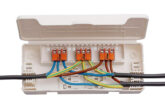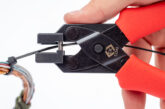
Experts at Lease Van have named the five things all tradespeople should do to maintain tools and increase their lifespan.
After a long day on the job, it may be tempting to skip tool maintenance, but taking care of them ensures projects run smoothly, safely, and to a high standard.
Many tradespeople rely on hand tools such as wrenches, hammers and screwdrivers for essential daily tasks, making them indispensable for roles in various trades.
Properly storing tools in a clean and dry environment will prevent damage, decrease the chance of rust developing and help keep them in good condition.
Other advice to increase the lifespan of tools include regularly sharpening, cleaning and lubricating them.
Tim Alcock, motoring expert at Lease Van said: “Properly maintaining tools will save tradespeople time and money in the long run because they are essential for their job.
“Failing to take proper care of tools could cause them to break, meaning there will be extra costs for businesses needing to replace expensive equipment.
“Simple steps like regularly cleaning and sharpening tools will help to increase their lifespan and prevent small issues from becoming major problems.
“Taking the time to check for tool damage regularly will also help to identify potential problems before they occur and cut costs of a full replacement.”
Tips for proper tool maintenance:
- Storage
Proper storage will prevent rust and damage, so it is important to keep tools in a clean and dry environment. Invest in shelving, racks and organisers, never store them on the ground and take steps to protect them from the elements.
- Lubrication
Lubricating tools and equipment will decrease the chances of rust developing and keep the overall mechanics running smoothly. In the long run, it will reduce the chance of friction, wear, and unexpected maintenance costs. Ensure to check lubrication recommendations from the manufacturer, as they could need oils, fluids or greases to ensure optimal performance.
- Sharpening
Regularly sharpening tools, especially those needed for cutting, will prolong their life and stop unnecessary strain. Blunt tools are more likely to break when used and sharpening will reduce the amount of money spent on replacing blades.
- Cleaning
Tools should be wiped down and cleaned every time they are used as a job should never start with dirty tools. Not only this, cleaning equipment after each shift will ensure optimal tool maintenance by getting rid of substances which could be corroding or damaging them. It will also help to enhance safety, improve results and cut costs in the long run.
- Damage inspections
Regular inspections for damage to tools will not only prevent accidents and reduce errors but also prevent further damage and full replacement. Common concerns to look out for include rust, wear or cracks, and spotting this early will identify potential problems before they occur.
Read more of the latest industry feature articles here








